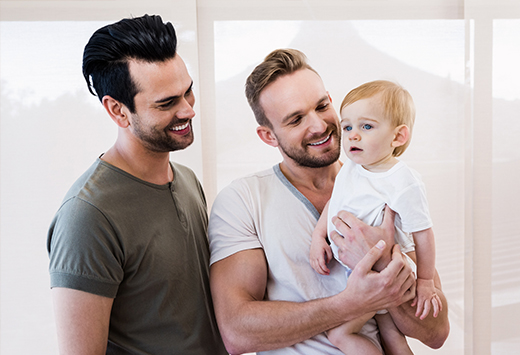When same-sex couples or LGBT individuals decide to become a family, they face several unique legal issues. In many states, special rules apply to gay and lesbian adoption, even when a child is born into a gay or lesbian partnership. As of March 31, 2016, adoptions by single LGBT individuals and same-sex couples became legal in every state in the United States. Although adoptions are legal, there are some specific laws about who can adopt that vary greatly from state to state.
Second-Parent Adoption or Same Sex Adoption Laws
Second-parent adoption is a legal procedure that allows a same-sex partner to adopt his or her partner’s biological or adoptive child even if they don’t have a legally recognized partnership. If a couple raises their child together and they’re not in a legal partnership, only one of them may become the adoptive parent by law. Not all states allow a second parent to adopt a child.
Currently, there are legal appeals in many states to allow second-parent adoption since that allows a child to have two legal parents in cases where the couple is not in a partnership recognized by the state. This is an important step for LGBT adoptions since a person who’s not a legal parent doesn’t have any legal decision-making authority over a child. In some states, a non-legal parent may not be able to consent to medical care for the child or even have the authority to approve simple things, like school field trips. Some states allow unmarried couples or couples who are not in a registered domestic partnership to get a second-parent adoption; on the other hand, there are also states that do not permit co-parent adoption.
Joint Adoption - LGBT Adoption Laws
LGBT couples and individuals in all states can petition for joint adoption, but they may be required to be in a legally recognized relationship like a marriage, domestic partnership, or civil union. If someone wants to adopt as an LGBT individual, laws of each state vary greatly. It’s the same for LGBT couples who are not in a legal partnership. So, before applying for an adoption the first step is to get to know all the laws in your state. Check out our LGBT Adoption Laws pages and contact a legal professional for the most up-to-date information.
State Laws that Limit Adoption by Unmarried LGBT Individuals and Couples
- In Alabama and Kentucky, unmarried LGBT couples cannot use the step-parent joint procedures, but married LGBT couples must be allowed to do so.
- In adoption placement, Arizona gives a preference to married couples over a single adult.
- Wisconsin, North Carolina, Kansas, and Nebraska laws prohibit second-parent adoption by unmarried couples.
- Mississippi has a statute that prohibits adoption by couples of the same gender, but under the Supreme Court ruling, this state must allow same-sex parents to adopt just like other married couples.
- Utah law prohibits all couples who are cohabiting in a non-marital sexual relationship to adopt a child. For LGBT individuals it may be hard to adopt since Utah gives preferences to couples adopting.
- Arkansas tried to prohibit anyone cohabiting with an unmarried partner from adoption, but the Supreme Court struck down this statute as unconstitutional.
Please note that this information is for educational purposes only and is not intended to be a substitute for professional legal advice. Information of this kind does change quickly; therefore, some information may be out-of-date. Please contact a legal professional for the most up-to-date information.




